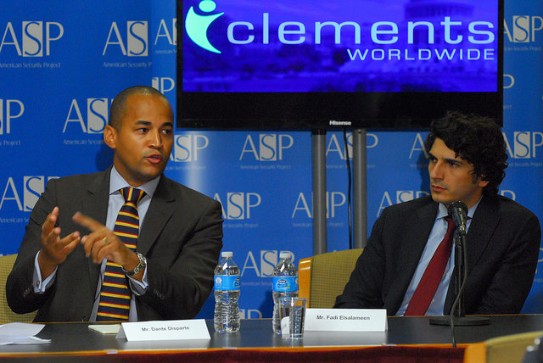
Managing Risk during the “African Century”
Podcast: Play in new window | Download
Subscribe: Apple Podcasts | RSS
While Africa has emerged as one of the most robust economic regions in recent years, doing business in the region has historically carried substantial risk from a variety of factors.
The third panel, How to Invest and Manage Risk for U.S. Companies, was chaired by ASP Senior Adjunct Fellow and Principal of YCF Group Fadi Elsalameen. He was joined on the panel by Dante Disparte, ASP Consensus Member and Managing Director of Clements Worldwide, Dr. Barbara Samuels, Executive Director of Global Clearing House for Development Finance, Andrew Herscowitz, Power Africa and Trade Africa Coordinator – USAID, and John Moran, Vice President of Insurance – OPIC.
Disparte set the stage for the discussion by declaring that “this is the African century.” Disparte’s experience as the Managing Director for Land Rover in 32 countries in Sub-Saharan Africa has contributed to his understanding of the real risk and challenges of conducting business in Africa. He warned firms from using the “standard playbook” when it comes to managing risk in Africa and cautioned against overgeneralizing and solely relying on numbers and statistics to inform business decisions.
To approach risk which is by default heterogeneous in the African context with a homogeneous strategy to address risk is absolutely a failure.
Looking at risk and investment in Africa more broadly, Disparte noted that American security is directly connected to the growth and success of the economies of Africa.
If the U.S. through its institutions, through its government agencies, its entire apparatus doesn’t give American firms access to African opportunities our national security is at stake; our economic competitiveness is at stake.
Dr. Barbara Samuels also emphasized the connection between economic development and U.S. national security. One of the most difficult obstacles to development in Africa is the issue of energy access. This, Samuels said, is something that needs to be addressed in order to make any real progress on the ground.
In Tanzania, for example, approximately 80% of the population doesn’t have access to energy, so it is about working from the ground level up in order to be successful.
Power Africa is one of the initiatives that has been put forth by the Obama administration to double access to electricity in Sub-Saharan Africa as well as helping U.S. companies tap into African economies. Andrew Herscowitz laid out the mission of Power Africa:
This is about partnership…This is about demonstrating that these are good countries in which to invest and looking at how we can bridge those market imperfections that are preventing the investments from happening.
John Moran of OPIC which works with Power Africa to support privately managed equity funds echoed Herscowitz’s remarks:
We want to get attractive projects done and also work with policy initiatives and working with the U.S. government to reformat and refine an appropriate legal and regulatory environment to get capital flowing.
One of the chief concerns for anyone conducting business in Africa is dealing with a variety of security situations, including piracy in East Africa. Fadi Elsalameen, whose firm manages the Liberian ship registry and deals with the threat piracy on a daily basis, acknowledged the seriousness of this issue and sub-state threats. He also declared that this is the nature of business in the region but piracy must be seen in a larger societal context.
Piracy is a very serious issue around Somalia but the issue is much deeper than just a bunch of pirates waiting on a ship to show up, it’s a very complicated issue related to different ports but to give a simple answer, yes, it is a very serious issue to us.
The most important aspect of piracy, as Disparte pointed out, is dealing with the root causes of the problem.
The long term solution will be derived when you have developmental solutions that stop people from Somalia and the rest of the countries that have deep developmental challenges from going to the water looking for hope.
The consensus among the panelists was that risk is a part of doing business in any part of the world and Africa is no different. From the U.S. government and Power Africa’s side, there needs to be proper coordination between donors, foreign companies and host nations. This is at the core of Power Africa, an “interagency one-stop shop” for companies who want to do business in Africa. Rather than just focusing on extracting resources, all agreed that U.S. companies are better served when the local capacity in these countries is increased. Forming the right partnerships is key to this.
Disparte wrapped up the conference with encouragement for those who care about Africa and strengthening American security and investment in the continent.
There is direct correlation to American interests and national security in terms of how we deploy capital and investments… There is also a risk in doing nothing. Sitting on the sidelines and letting firms from China and other countries tap into the African growth narrative is at our own expense. It’s all correlated.





